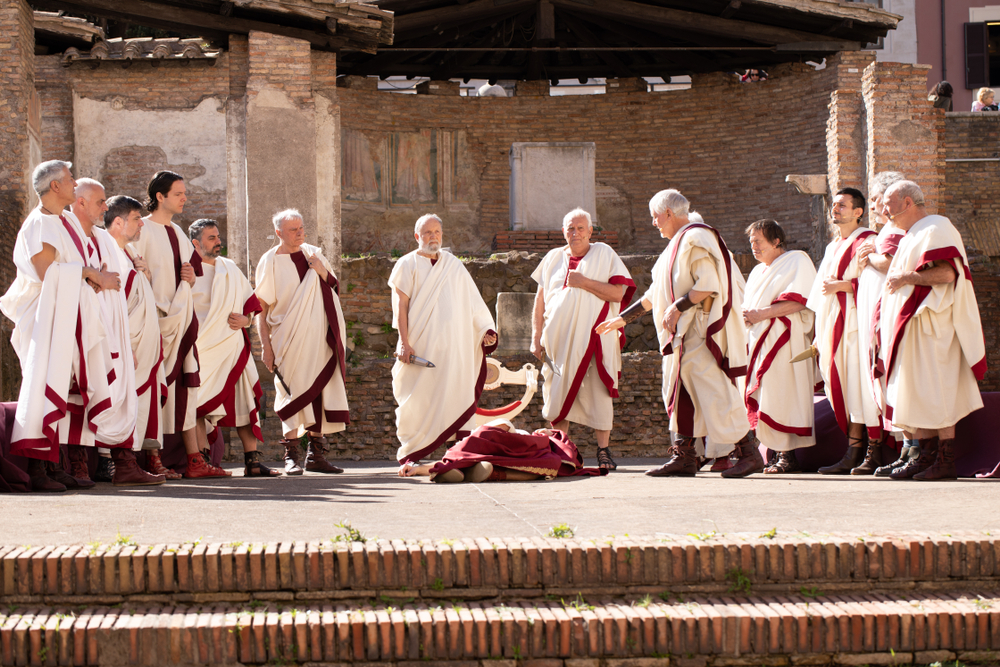The name of the Acton Institute’s magazine, Religion and Liberty, seems to many people an oxymoron. The word “religion” apparently emerged from religare, “to bind together, to constrain.” How can something that binds be liberating? Here’s the beginning of a response to that potential paradox.
Julius Caesar was the first Shakespeare play I read, at age 13. That’s six decades ago. Shakespeare taught me that the Romans called March 15 “the Ides of March,” as we might now say “9/11” rather the 11th day of September. The play also introduced me to thinking about death, because on March 15 in the year we now call 44 B.C., Roman senators assassinated Julius Caesar.
The question of death was abstract to me then. Three of my grandparents had died in their 70s or early 80s, but I wasn’t close to any of them. No one in my immediate family, nor any of the children I knew, had died. Had I lived a century or two earlier, I would not have assumed that death would have polite manners and wait for decades. Then again, half of humanity never graduated from childhood.
In the 1960s, though, antibiotics and other medical innovations waved their magic wands. So when I read Julius Caesarearly in 1964 in the light of the then-recent assassination of President John F. Kennedy, my focus was on that murder most foul rather than mortality through other causes. Caesar was phenomenally successful as a general, politician, author, and religious official. When a shrill soothsayer told him to “Beware the Ides of March,” Caesar’s confident response made great sense: “He is a dreamer. Let us leave him.”
Shakespeare, in line with the historical sources he had, heightened the drama by making Caesar’s wife, Calpurnia, also a dreamer. In her sleep she cries out three times, “Help, ho! They murder Caesar.” Awake, she tells him, “Think you to walk forth? You shall not stir out of your house today.” But he doesn’t want either the Senate or his wife bossing him. He brags that he can outstare those who threaten him: “When they shall see the face of Caesar, they are vanished.”
Calpurnia pleads with him, and he refers to himself in the third person, as some athletes do: “Caesar shall go forth.” As Calpurnia objects a third time, Shakespeare gives Caesar what becomes a much quoted line: “Cowards die many times before their deaths; the valiant never taste of death but once.”
And yet, Caesar not only in drama but in life (according to Suetonius and Plutarch) appears to have been frightened. He asks about the augurers, fortune tellers who peer at animal entrails. They offer warnings. Shakespeare’s Calpurnia submissively pleads once more: “Let me, upon my knee, prevail in this.” Caesar then asks his good friend Brutus to tell the Senate he’s staying home.
A lie changes everything. Brutus tells Caesar that Rome’s senators have decided to make him king, but if he absents himself, they may change their mind and they will say he is afraid. Death is possible but dishonor is probable, unless he walks to the Senate building. He does that, and the senators assassinate him.
Wealthy and literate Roman leaders such as Julius Caesar grew up on Homer’s Iliad. Caesar prided himself on his supposed descent from Aeneas, the survivor of Troy and purported ancestor of Rome’s founders, Romulus and Remus. In Act I, Scene 2 of Julius Caesar, conspirator Cassius recalls rescuing Caesar from drowning: “Caesar cried ‘Help me, Cassius, or I sink!’ I, as Aeneas, our great ancestor, / Did from the flames of Troy upon his shoulder.” Cassius, full of envy and malice, says Caesar contracted a fever while warring in Spain and acted “as a sick girl” with “coward lips.”
So Caesar had something to prove on the Ides of March. Poet/biographer Lucan, born A.D. 39, depicts Caesar (in Book 9 of Pharsalia) visiting the ruins of Troy and praying, “You gods of the dead, that inhabit the ruins of Troy; you household gods of my ancestor Aeneas … I duly call on you, I, the most glorious descendant … Grant good fortune to the end of my journey, and I will restore your nation … a Roman Troy shall rise.’”
But what did the Iliad teach about Trojan War bravery in the face of death? Paris, the Trojan who caused the war by seducing Helen, goes out to fight “like a god … wearing a panther skin on his shoulder.” Then, facing Menelaos, the Spartan king, Paris’ “heart collapsed, and he shrank back into the cloud of his companions, avoiding death.” The strongest Greek, Achilles, was initially “gripped with fear” when he faced Aeneas, who is also afraid: “an immense pain spread over his eyes in terror.”
Even the greatest Trojan, Hector, fears death. Here, from Book 22 of the Iliad: “A trembling came over Hector / when he saw Achilles / … he left the gates behind him and ran in fear / … Hector fled in Terror beneath the walls of the Trojans.” Finally, deceived by Athena and deserted by Apollo, Hector dies and Achilles drags his corpse through the dirt. But that’s not the end: Greeks and Trojans lived in an enchanted world where gods and mortals were intertwined, so Hector had some life after death. His mother, Hecuba, says to his corpse, “Now you are fresh as new-morning dew.”
In other classic Greek and Roman works, such as Virgil’s Aeneid, written 15 to 25 years after Caesar’s assassination, heroes regularly fear death but also manage to overcome that fear in their search for honor and glory—and their confidence that there is some kind of afterlife. We don’t know exactly what Julius Caesar believed about life after death, but we do know what Romans typically believed, thanks to recent cemetery-level work by Charles W. King of the University of Nebraska-Omaha and others.
Some Romans in Caesar’s time followed atheist Epicurus (341–270 B.C.) in seeing themselves as merely material beings: “When death is present, we no longer exist.” But King, in The Ancient Roman Afterlife, offers evidence from tombstones of common beliefs: “It took time and it cost money to engrave words—even abbreviations—on stone, and one could reasonably assume that Roman engravers, like their modern equivalents, charged by the word or by the letter. Why then would so many Romans, not just at Rome but over a broad geographic area and over a time period of more than 500 years, pay to have Dis Manibus [to the manes (pronounced mah-nays), the spirits of the dead] engraved on their tombstones?”
King concludes, “The simplest explanation is that the widespread dedication of the tombstones to divine manes reflects a widespread belief in the existence of divine manes.” King documents Roman beliefs that the dead manes had active lives, with their fingers in earthly pies. A dead wife could make sure her husband would live to be an old man. A dead father could arrange an extension of his son’s life. A dead child could work to spare from death, temporarily, her sister and parents. The dead watched over the living and could protect them. The dead could also wreak vengeance, kill enemies, and settle their own grievances. So busy—but so much time.
The power of dozens of gods and thousands of manes placed pressure on the living. Roman believers thought divine sparks lived in their heads and were somewhat free-floating after death. Busts of ancestors were works of religion as well as art: a bust in the atrium of a house was an invitation to a mane to move in for a while and bless the residents. It was important to honor manes in precise ritual ways that could include sacrifices, especially during the nine-day February festival of Parentalia. Manes, if annoyed, could become trouble-making lemures (leh-mur-ays), but proper sacrifices during the Lemuria festival (May 9, 11, and 13) could ease their pain.
Many Romans believed their lives depended on how precisely they made sacrifices and fulfilled vows to gods and to the living dead. Atheism led to fear of death, but Roman religion offered some hope—and also an enslavement to ritual.
A humble analogy may clarify this. In the first half of the 20th century, figure skaters in most competitions gained 60% of their points by acing “compulsory figures”—for example, making perfect figure eights—in exercises that took hours. Only 40% of a skater’s score came from imaginative freestyle performances. Television’s demands have now changed the scoring system by emphasizing five minutes of action. Classical Roman religion was like old-style scoring: Don’t deviate from the figure eight.
Julius Caesar as general understood the emphasis on precise ritual. He supervised perfect lustrations, religious rites that purportedly cleansed soldiers of any guilt for killing opponents. His faithfulness to detail was such that other Romans chose him to be pontifex maximus, head of the college of pontiffs, the definer of ritual. Romans had a choice: follow Epicurus and fight fears of nonexistence, or follow the rituals each day and don’t make a mistake that could irritate any of a myriad of gods and manes.
Either way, Romans were afraid. Epicurus pushed ataraxia, freedom from anxiety, but acknowledged death to be “the most dreaded of evils.” Stoics such as Seneca (4 B.C.–A.D. 65) and Marcus Aurelius (A.D. 121–180) said we could meditate on death and move past fright to aequanimitas (peace of mind) and apatheia (indifference). But, even if that worked for them, it didn’t work for many Romans.
Epictetus (A.D. 55–135) called fear of death “the origin of all human evils, and of baseness and cowardice.” Some Romans did whatever it took for them to stay alive, including stealing, lying, and killing others. Some religious leaders went through the motions with required sacrifices but tried to drink from a psychological fountain of youth by deserting old wives and grabbing young women.
And some learned from Hebrews 2:15 that Jesus, by sacrificing his life, delivered “all those who through fear of death were subject to lifelong slavery.” A Gospel faith binds us to Christ but liberates us from both worry about nonexistence and the fevered practice of man-made rituals.
(The translation of the Iliad used is that of Barry B. Powell, published by Oxford University Press.)

